【牛津版】八年级英语上册Unit8Naturaldisasters词汇与语法基础训练卷_含答案
- 格式:doc
- 大小:94.00 KB
- 文档页数:22
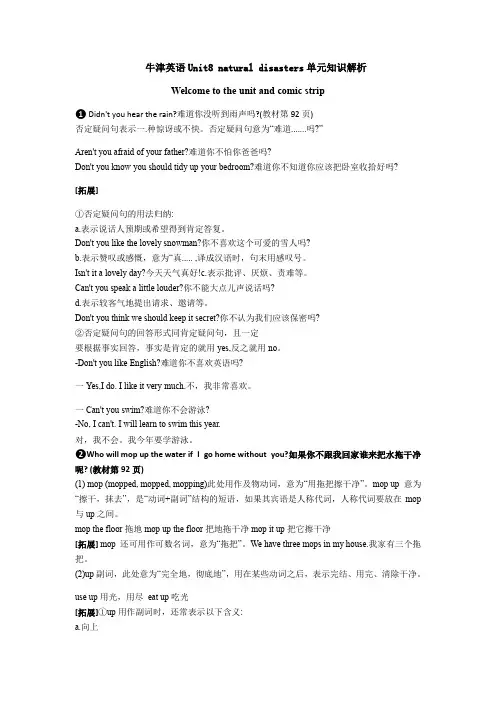
牛津英语Unit8 natural disasters单元知识解析Welcome to the unit and comic strip❶ Didn't you hear the rain?难道你没听到雨声吗?(教材第92页)否定疑问句表示一.种惊讶或不快。
否定疑问句意为“难道.......吗?”Aren't you afraid of your father?难道你不怕你爸爸吗?Don't you know you should tidy up your bedroom?难道你不知道你应该把卧室收拾好吗?[拓展]①否定疑问句的用法归纳:a.表示说话人预期或希望得到肯定答复。
Don't you like the lovely snowman?你不喜欢这个可爱的雪人吗?b.表示赞叹或感慨,意为“真..... ,译成汉语时,句末用感叹号。
Isn't it a lovely day?今天天气真好!c.表示批评、厌烦、责难等。
Can't you speak a little louder?你不能大点儿声说话吗?d.表示较客气地提出请求、邀请等。
Don't you think we should keep it secret?你不认为我们应该保密吗?②否定疑问句的回答形式同肯定疑问句,且一定要根据事实回答,事实是肯定的就用yes,反之就用no。
-Don't you like English?难道你不喜欢英语吗?一Yes,I do. I like it very much.不,我非常喜欢。
一Can't you swim?难道你不会游泳?-No, I can't. I will learn to swim this year.对,我不会。
我今年要学游泳。
❷Who will mop up the water if I go home without you?如果你不跟我回家谁来把水拖干净呢? (教材第92页)(1) mop (mopped, mopped, mopping)此处用作及物动词,意为“用拖把擦干净”。
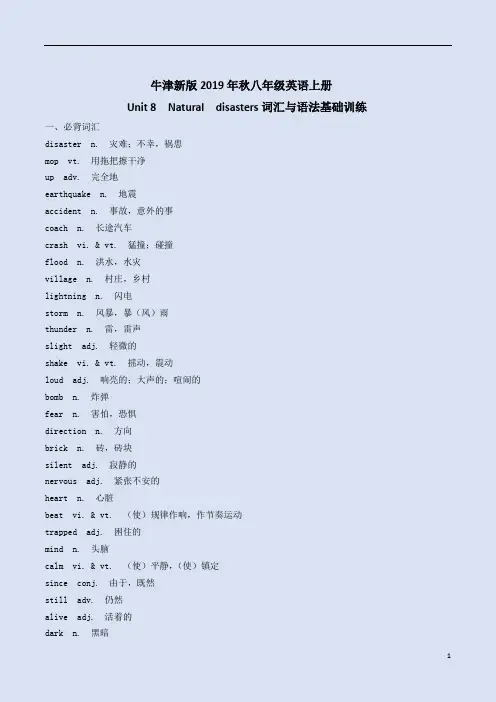
牛津新版2019年秋八年级英语上册Unit 8 Natural disasters词汇与语法基础训练一、必背词汇disaster n. 灾难;不幸,祸患mop vt. 用拖把擦干净up adv. 完全地earthquake n. 地震accident n. 事故,意外的事coach n. 长途汽车crash vi. & vt. 猛撞;碰撞flood n. 洪水,水灾village n. 村庄,乡村lightning n. 闪电storm n. 风暴,暴(风)雨thunder n. 雷,雷声slight adj. 轻微的shake vi. & vt. 摇动,震动loud adj. 响亮的;大声的;喧闹的bomb n. 炸弹fear n. 害怕,恐惧direction n. 方向brick n. 砖,砖块silent adj. 寂静的nervous adj. 紧张不安的heart n. 心脏beat vi. & vt. (使)规律作响,作节奏运动trapped adj. 困住的mind n. 头脑calm vi. & vt. (使)平静,(使)镇定since conj. 由于,既然still adv. 仍然alive adj. 活着的dark n. 黑暗shout n. 呼喊,喊叫声safe adj. 安全的asleep adj. 睡着的break vi. 损坏;打破towel n. 毛巾,浴巾rule n. 规则railway n. 铁路pancake n. 烙饼,薄饼burn n. 烧伤,烫伤,灼伤board n. 木板headache n. 头痛toothache n. 牙痛countryside n. 乡下, 农村nearly adv. 几乎,将近clear vt. 清除,清理shaking n. 摇动,震动二、重点词汇1. break verb /breɪk/1). to (cause something to) separate suddenly or violently into two or more pieces,or to (cause something to) stop working by being damaged破碎,破裂;打破;打断;损坏,弄坏例句:The dish fell to the floor and broke.碟子掉到地上摔碎了。
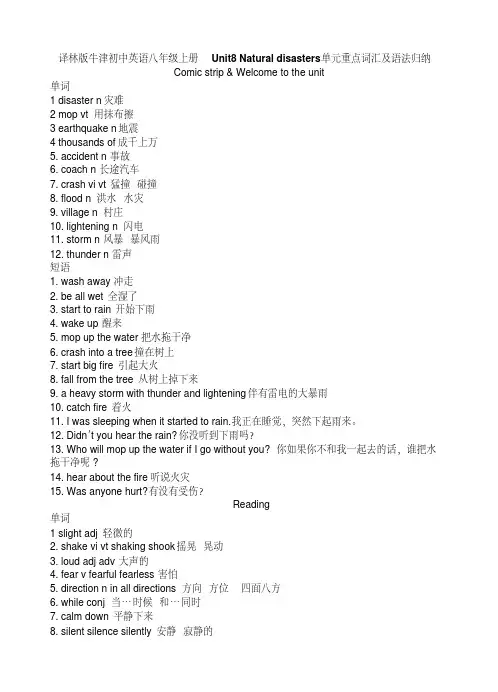
译林版牛津初中英语八年级上册Unit8 Natural disasters单元重点词汇及语法归纳Comic strip & Welcome to the unit单词1 disaster n 灾难2 mop vt 用抹布擦3 earthquake n 地震4 thousands of 成千上万5. accident n 事故6. coach n 长途汽车7. crash vi vt 猛撞碰撞8. flood n 洪水水灾9. village n 村庄10. lightening n 闪电11. storm n 风暴暴风雨12. thunder n 雷声短语1. wash away 冲走2. be all wet 全湿了3. start to rain 开始下雨4. wake up 醒来5. mop up the water 把水拖干净6. crash into a tree 撞在树上7. start big fire 引起大火8. fall from the tree 从树上掉下来9. a heavy storm with thunder and lightening 伴有雷电的大暴雨10. catch fire 着火11. I was sleeping when it started to rain. 我正在睡觉,突然下起雨来。
12. Didn’t you hear the rain? 你没听到下雨吗?13. Who will mop up the water if I go without you? 你如果你不和我一起去的话,谁把水拖干净呢?14. hear about the fire 听说火灾15. Was anyone hurt? 有没有受伤?Reading单词1 slight adj 轻微的2. shake vi vt shaking shook 摇晃晃动3. loud adj adv 大声的4. fear v fearful fearless 害怕5. direction n in all directions 方向方位四面八方6. while conj 当…时候和…同时7. calm down 平静下来8. silent silence silently 安静寂静的。
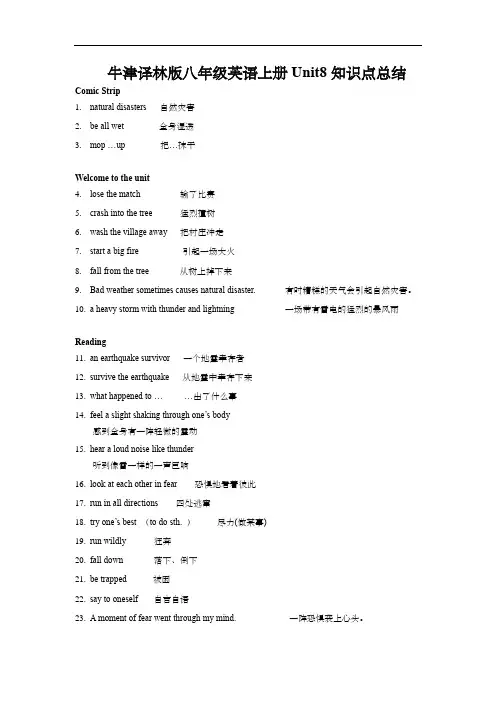
牛津译林版八年级英语上册Unit8知识点总结Comic Strip1.natural disasters 自然灾害2.be all wet 全身湿透3.mop …up 把…抹干Welcome to the unit4.lose the match 输了比赛5.crash into the tree 猛烈撞树6.wash the village away 把村庄冲走7.start a big fire 引起一场大火8.fall from the tree 从树上掉下来9.Bad weather sometimes causes natural disaster. 有时糟糕的天气会引起自然灾害。
10.a heavy storm with thunder and lightning 一场带有雷电的猛烈的暴风雨Reading11.an earthquake survivor 一个地震幸存者12.survive the earthquake 从地震中幸存下来13.what happened to … …出了什么事14.feel a slight shaking through one’s body感到全身有一阵轻微的震动15.hear a loud noise like thunder听到像雷一样的一声巨响16.look at each other in fear 恐惧地看着彼此17.run in all directions 四处逃窜18.try one’s best (to do sth. )尽力(做某事)19.run wildly狂奔20.fall down落下、倒下21.be trapped 被困22.say to oneself自言自语23.A moment of fear went through my mind. 一阵恐惧袭上心头。
24.tell sb to calm down让我自己平静下来25.shout for help大声呼救26.stay alive活着27.a packet of chocolate 一包巧克力28.try to find my way out 尽力找到出路29.hear shouts from excited people听到激动的人们的呼喊声30.be in a great hurry to do sth急匆匆地去做…31.move away the bricks 把砖块搬开32.the loud noise following lightning紧随闪电过后的巨大声响33.be trapped in a dark place被困在一个昏暗的地方be trapped under the bricks and stones被困在砖块和石头下面Grammar34.look for some photos of …for… 为…寻找…的照片35.discuss…with…与…讨论discussion n.36.plan a trip to计划到…旅行37.try to find a map of 尽力找到…地图38.A snowstorm hit the city early this morning. 一大清早,一场暴风雪袭击了这个城市。
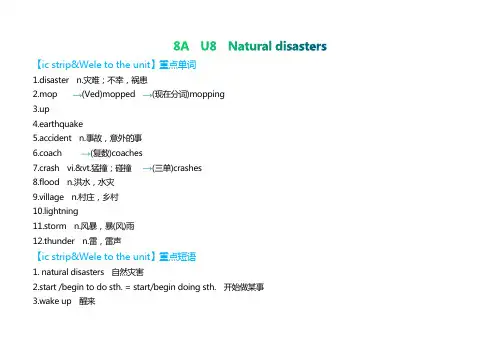
【ic strip&Wele to the unit】重点单词1.disaster n.灾难;不幸,祸患2.mop (Ved)mopped (现在分词)mopping3.up4.earthquake5.accident n.事故,意外的事6.coach (复数)coaches7.crash vi.&vt.猛撞;碰撞(三单)crashes8.flood n.洪水,水灾9.village n.村庄,乡村10.lightning11.storm n.风暴,暴(风)雨12.thunder n.雷,雷声【ic strip&Wele to the unit】重点短语1. natural disasters 自然灾害2.start /begin to do sth. = start/begin doing sth. 开始做某事3.wake up 醒来4.mop up 把......拖干净5.mop up the water 把水拖干净6.thousands of people 成千上万的人7.thousands of 成千上万的8.crash into 撞上9.wash away 冲走10.fall from ... 从...·落下11.hear about/of 听说12.what happened 发生了什么13.a heavy storm with thunder and lightning 一场雷电交加的大风暴14.catch fire 着火【ic strip&Wele to the unit】重点句型1. Didn't you hear the rain?难道你没听到雨声吗?2. Who will mop up the water if I go home without you? 如果你不跟我回家,谁将拖干水呢?3. Lightning hit a classroom building and it caught fire. 一幢教学楼被闪电击中而着火了。
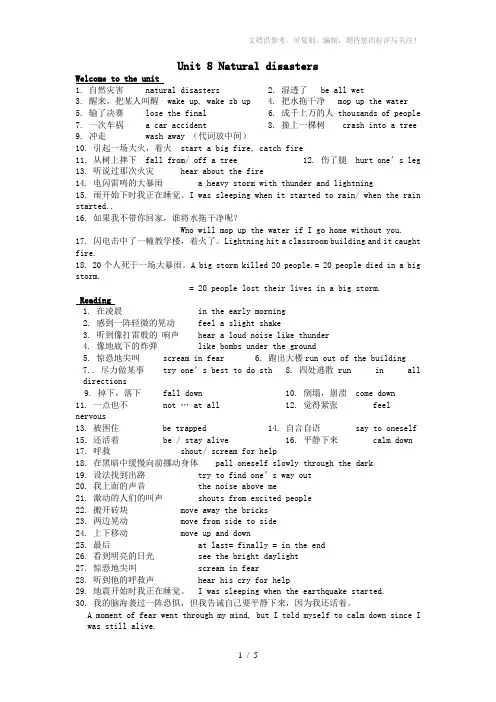
Unit 8 Natural disastersWelcome to the unit1. 自然灾害natural disasters2. 湿透了 be all wet3. 醒来,把某人叫醒 wake up, wake sb up4. 把水拖干净mop up the water5. 输了决赛lose the final6. 成千上万的人 thousands of people7. 一次车祸 a car accident8. 撞上一棵树 crash into a tree9. 冲走wash away (代词放中间)10. 引起一场大火,着火start a big fire, catch fire11. 从树上摔下fall from/ off a tree 12. 伤了腿hurt one’s leg13. 听说过那次火灾hear about the fire14. 电闪雷鸣的大暴雨 a heavy storm with thunder and lightning15. 雨开始下时我正在睡觉。
I was sleeping when it started to rain/ when the rain started..16. 如果我不带你回家,谁将水拖干净呢?Who will mop up the water if I go home without you. 17. 闪电击中了一幢教学楼,着火了。
Lightning hit a classroom building and it caught fire.18. 20个人死于一场大暴雨。
A big storm killed 20 people.= 20 people died in a big storm.= 20 people lost their lives in a big storm.Reading1. 在凌晨in the early morning2. 感到一阵轻微的晃动feel a slight shake3. 听到像打雷般的响声hear a loud noise like thunder4. 像地底下的炸弹like bombs under the ground5. 惊恐地尖叫scream in fear6. 跑出大楼run out of the building7.. 尽力做某事try one’s best to do sth8. 四处逃散 run in all directions9. 掉下,落下fall down 10. 倒塌,崩溃come down11. 一点也不not … at all12. 觉得紧张feel nervous13. 被困住be trapped 14. 自言自语say to oneself 15. 还活着be / stay alive 16. 平静下来calm down17. 呼救shout/ scream for help18. 在黑暗中缓慢向前挪动身体pall oneself slowly through the dark19. 设法找到出路try to find one’s way out20. 我上面的声音the noise above me21. 激动的人们的叫声shouts from excited people22. 搬开砖块move away the bricks23. 两边晃动move from side to side24. 上下移动move up and down25. 最后at last= finally = in the end26. 看到明亮的日光see the bright daylight27. 惊恐地尖叫scream in fear28. 听到他的呼救声hear his cry for help29. 地震开始时我正在睡觉。
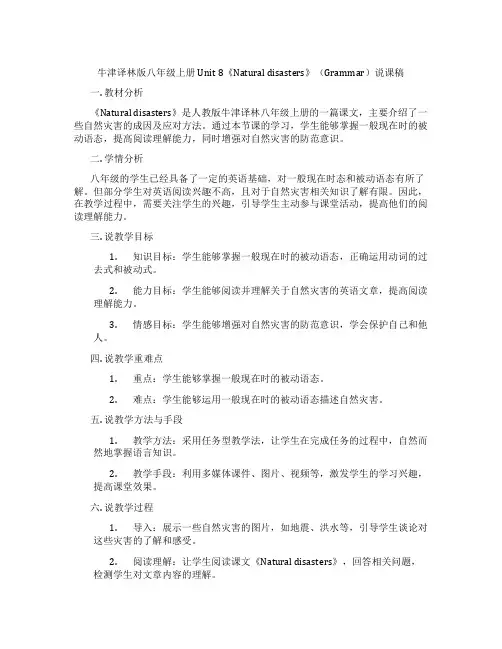
牛津译林版八年级上册Unit 8《Natural disasters》(Grammar)说课稿一. 教材分析《Natural disasters》是人教版牛津译林八年级上册的一篇课文,主要介绍了一些自然灾害的成因及应对方法。
通过本节课的学习,学生能够掌握一般现在时的被动语态,提高阅读理解能力,同时增强对自然灾害的防范意识。
二. 学情分析八年级的学生已经具备了一定的英语基础,对一般现在时态和被动语态有所了解。
但部分学生对英语阅读兴趣不高,且对于自然灾害相关知识了解有限。
因此,在教学过程中,需要关注学生的兴趣,引导学生主动参与课堂活动,提高他们的阅读理解能力。
三. 说教学目标1.知识目标:学生能够掌握一般现在时的被动语态,正确运用动词的过去式和被动式。
2.能力目标:学生能够阅读并理解关于自然灾害的英语文章,提高阅读理解能力。
3.情感目标:学生能够增强对自然灾害的防范意识,学会保护自己和他人。
四. 说教学重难点1.重点:学生能够掌握一般现在时的被动语态。
2.难点:学生能够运用一般现在时的被动语态描述自然灾害。
五. 说教学方法与手段1.教学方法:采用任务型教学法,让学生在完成任务的过程中,自然而然地掌握语言知识。
2.教学手段:利用多媒体课件、图片、视频等,激发学生的学习兴趣,提高课堂效果。
六. 说教学过程1.导入:展示一些自然灾害的图片,如地震、洪水等,引导学生谈论对这些灾害的了解和感受。
2.阅读理解:让学生阅读课文《Natural disasters》,回答相关问题,检测学生对文章内容的理解。
3.语法讲解:讲解一般现在时的被动语态,让学生通过例句和实践,掌握这一语法知识。
4.小组讨论:学生分成小组,讨论如何用英语描述一种自然灾害,以及如何防范。
5.展示与评价:每个小组选择一名代表,展示他们的讨论成果,其他同学和老师进行评价。
6.总结与反思:教师引导学生总结课堂所学,让学生反思自己在课堂上的表现,以及如何提高。
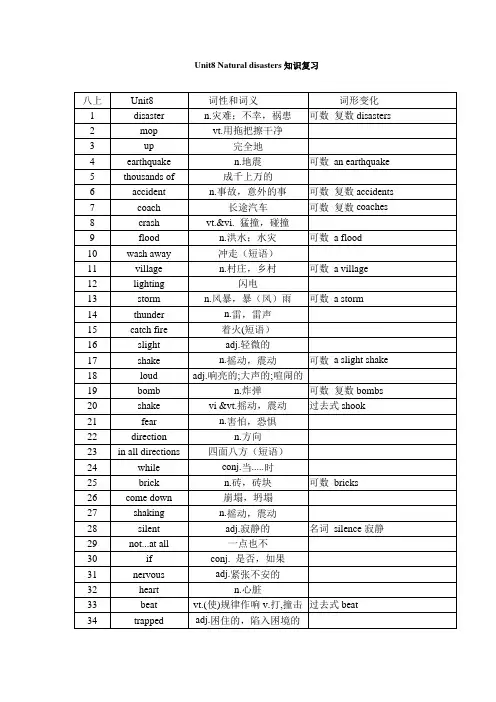
Unit8 Natural disasters知识复习巩固练习一.单项选择()1.The floor is quite wet. My teacher asked us quickly.A.mop up itB.mopped it upC.to mop it upD.to mop up it()2.—What should I do when the earthquake happens, Dad?—First of all, it’s important to and hide yourself in the corners of the room.A.calm downB.put downC.get downD.fall down()3.—did the accident happen?—While we a Chinese lesson yesterday.A.When; have hadB.While; are havingC.When; were havingD.While; have()4.—What happened your uncle?—His car crashed a tree on his way back home yesterday evening.A.to; toB.with; toC.to; intoD.of; under()5.I was writing a diary my brother was watching TV yesterday evening.A.beforeB.afterC.untilD.while()6.—Uncle Wang, I dropped by your home at 6:00 p.m. yesterday, but nobody was in.—Oh, I a meeting.A.was havingB.am havingC.will haveD.have had()7.He felt so that he fell soon.A.sleepy; asleepB.asleep; sleepyC.sleeping; asleepD.sleepy; sleepy()8. wonderful The Reader is! Many people enjoy the TV programme.A.WhatB.How aC.HowD.What a()9.—The picture of the Snowflake Boy was very popular in 2018.—Yeah, it received Internet hits.A.thousands ofB.thousandC.hundredD.hundreds()10.You’ll get better grades you follow the teachers’ advice.A.ifB.untilC.thoughD.while()11.While Xiao Ming his homework, his mother came with a cup of tea.A.has doingB.has doneC.is doingD.was doing()12.As I to take photos of the little cat, suddenly a big snowball me.A.was trying; was hittingB.tried; was hittingC.was trying; hitD.was tried; hit()13.This washing machine . It needs to be repaired.A.worked wellB.broke downC.ran upD.went on()14.According to a recent survey, three-fifths of working mothers in China don’t want to hav e a second child.A.mostlyB.especiallyC.partlyD.nearly()15.His grandfather did his best to keep the tree but it died in the end.A.aliveB.asleepC.absentD.awake( )16. We were walking slowly when a strong blew from behind.A. windB. cloudC. stormD. snow( )17. There are some bricks on the road. Let’s them, or there may be traffic accidents.A. carryB. clearC. catchD. fix( )18. I was working hard on the problem when a wonderful idea suddenly went____ my mind.A. inB. overC. acrossD. through( )19. At the beginning of the exam, it was hard for me to calm down. I could feel my heartfast.A. shakingB. beatingC. jumpingD. running( )20. — Were you when you were playing in the final?— Not at all. I was quite sure that our team would win.A. excitedB. interestedC. calmD. nervous( )21. — Which of the following words is NOT a compound word?—is.A. ToothacheB. CarelessC. RailwayD. Rainstorm( )22. An earthquake happened in Ya’an Sichuan in April 2013. peoplelost their houses in it.A. ThousandsB. Thousand ofC. Thousands ofD. Thousand( )23. — Do you know if it tomorrow?— I am not sure. It may snow if the temperature below zero.A. snows; will dropB. will snow; will dropC. will snow; dropsD. snows; drops( )24. Tom didn’t hear the car because he ________ music through headphone.A. listened toB. was listening toC. was listen toD. is listening to( )25. The boy was running towards his mother _________ he suddenly fell over.A. afterB. whileC. whenD. as( )26. A football me when I past the football field. My arm still hurts now.A. hit; was walkingB. was hitting; was walkingC. was hitting; walkedD. hit; am walking( )27. — We plan to drive our car to Dalian next month.— Are you joking? What if it ?A. breaks awayB. breaks downC. breaks upD. breaks off( )28. from the smoke, you should stay low to the ground while running out of a burning house.A. To keeping awayB. To keep awayC. Keep awayD. Keeping away( )29. As Tom is a brave boy, he knows how to stay calm when there is danger.Which word can replace (代替) “As” here?A. SoB. SinceC. UntilD. If( )30. — A typhoon called Usagi (天兔) hit Guanddong Province and it killed 30 people.— ________________It was really a terrible disaster.A. They were too careless.B. Thank goodness!C. Never mind.D. I am sorry to hear that.( )31. —Linda, I called you this morning, but nobody answered the phone.—I’m sorry. I ______ football with my friends then.A. playB. playedC. am playingD. was playing( )32. The birds flew away ______every direction as soon as they found themselves ______.A. in; in dangerB. to;dangerousC. to;in dangerD. in; dangerous( )33. If you ______,I’ll ______ by myself.A. don’t come; mop up itB. won’t come; mop it upC. don’t come; mop it upD. won’t come; mop up it( )34. Mr Su was driving in the snowstorm ______his car crashed into a tree.A. whenB. asC. whileD. as soon as( )35. —I’m sorry I ______m y exercise book at home.—Don’t forget______ it to school tomorrow, please.A. forgot;to takeB. left;to bringC. forgot; to bringD. left;to take( )36. —I’m really ______before the competition.—Take it easy. Sure you are the best.A. coolB. seriousC. nervousD. patient( )37, The earthquake ______when I ______some cleaning,A. starts;was doingB. started; was doingC. was starting; was doingD. starts; were doing( )38. —My brother hurt his legs when he rode his bike on the way back home. —______.A. That’s too badB. He is very carelessC. Be careful next timeD. Tm sorry to hear that( )39. The government of Linyi is building _____cheap and good houses for the people.A. thousandB. thousandsC. thousand ofD. thousands of( )40. —______will the film begin? —_______ half past seven.A. How long;Not untilB. How soon;UntilC. How long;UntilD. How soon;Not until二.完成句子1.蝴蝶朝四面八方飞去。
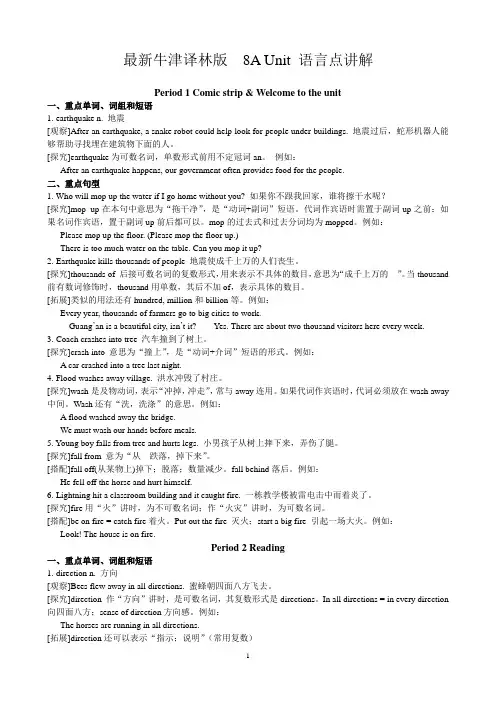
最新牛津译林版8A Unit 语言点讲解Period 1 Comic strip & Welcome to the unit一、重点单词、词组和短语1. earthquake n. 地震[观察]After an earthquake, a snake robot could help look for people under buildings. 地震过后,蛇形机器人能够帮助寻找埋在建筑物下面的人。
[探究]earthquake为可数名词,单数形式前用不定冠词an。
例如:After an earthquake happens, our government often provides food for the people.二、重点句型1. Who will mop up the water if I go home without you? 如果你不跟我回家,谁将擦干水呢?[探究]mop up在本句中意思为“拖干净”,是“动词+副词”短语。
代词作宾语时需置于副词up之前:如果名词作宾语,置于副词up前后都可以。
mop的过去式和过去分词均为mopped。
例如:Please mop up the floor. (Please mop the floor up.)There is too much water on the table. Can you mop it up?2. Earthquake kills thousands of people 地震使成千上万的人们丧生。
[探究]thousands of 后接可数名词的复数形式,用来表示不具体的数目,意思为“成千上万的---”。
当thousand 前有数词修饰时,thousand用单数,其后不加of,表示具体的数目。
[拓展]类似的用法还有hundred, million和billion等。
例如:Every year, thousands of farmers go to big cities to work.---Guang’an is a beautiful city, isn’t it? ---Yes. There are about two thousand visitors here every week.3. Coach crashes into tree 汽车撞到了树上。
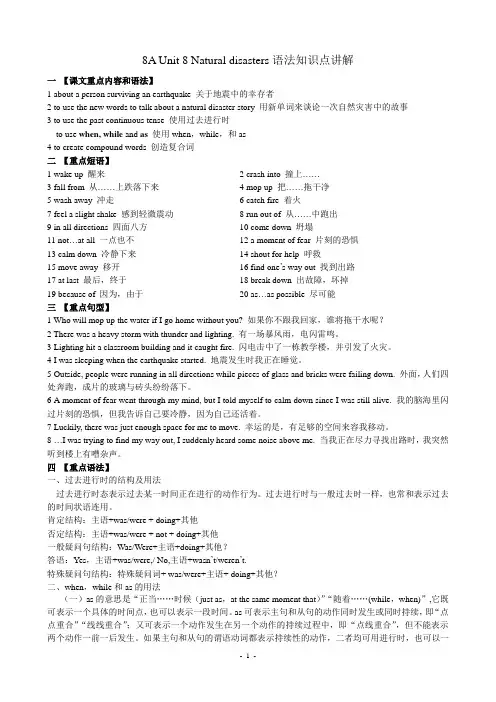
8A Unit 8 Natural disasters语法知识点讲解一【课文重点内容和语法】1 about a person surviving an earthquake 关于地震中的幸存者2 to use the new words to talk about a natural disaster story 用新单词来谈论一次自然灾害中的故事3 to use the past continuous tense 使用过去进行时to use when, while and as 使用when,while,和as4 to create compound words 创造复合词二【重点短语】1 wake up 醒来2 crash into 撞上……3 fall from 从……上跌落下来4 mop up 把……拖干净5 wash away 冲走6 catch fire 着火7 feel a slight shake 感到轻微震动8 run out of 从……中跑出9 in all directions 四面八方10 come down 坍塌11 not…at all 一点也不12 a moment of fear 片刻的恐惧13 calm down 冷静下来14 shout for help 呼救15 move away 移开16 find one’s way out 找到出路17 at last 最后,终于18 break down 出故障,坏掉19 because of 因为,由于20 as…as possible 尽可能三【重点句型】1 Who will mop up the water if I go home without you? 如果你不跟我回家,谁将拖干水呢?2 There was a heavy storm with thunder and lighting. 有一场暴风雨,电闪雷鸣。
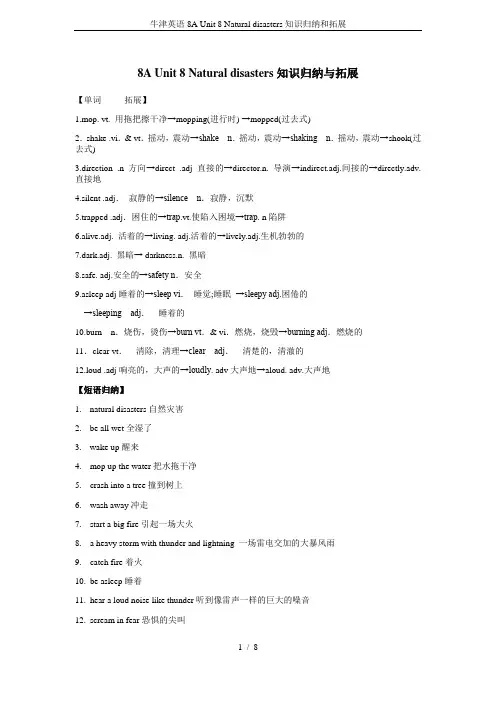
8A Unit 8 Natural disasters知识归纳与拓展【单词拓展】1.mop. vt. 用拖把擦干净→mopping(进行时) →mopped(过去式)2.shake .vi.& vt.摇动,震动→shake n.摇动,震动→shaking n.摇动,震动→shook(过去式)3.direction .n 方向→direct .adj 直接的→director.n. 导演→indirect.adj.间接的→directly.adv.直接地4.silent .adj.寂静的→silence n.寂静,沉默5.trapped .adj.困住的→trap.vt.使陷入困境→trap. n陷阱6.alive.adj. 活着的→living. adj.活着的→lively.adj.生机勃勃的7.dark.adj. 黑暗→ darkness.n. 黑暗8.safe. adj.安全的→safety n.安全9.asleep adj睡着的→sleep vi.睡觉;睡眠→sleepy adj.困倦的→sleeping adj.睡着的10.burn n.烧伤,烫伤→burn vt.& vi.燃烧,烧毁→burning adj.燃烧的11.clear vt.清除,清理→clear adj.清楚的,清澈的12.loud .adj响亮的,大声的→loudly. adv大声地→aloud. adv.大声地【短语归纳】1.natural disasters自然灾害2.be all wet全湿了3.wake up醒来4.mop up the water把水拖干净5.crash into a tree撞到树上6.wash away冲走7.start a big fire引起一场大火8. a heavy storm with thunder and lightning 一场雷电交加的大暴风雨9.catch fire着火10.be asleep睡着11.hear a loud noise like thunder听到像雷声一样的巨大的噪音12.scream in fear恐惧的尖叫13.in all directions四面八方14.pieces of glass and bricks玻璃块和砖块e down崩塌16.feel nervous感觉紧张不安的17.a moment of fear一阵恐惧18.calm down平静下来19.be still alive仍然活着20.pull oneself slowly through the dark在黑暗中慢慢的向前移动身体21.be trapped被困住的22.find one’s way out找到出路23.keep sb safe保持某人安全24.soon after…在…之后不久25.a terrible snowstorm一场可怕的暴风雪26.break down(车辆或机器)出故障,坏掉27.fall over跌倒28.get out as soon as possible尽早逃出去29.cover one’s month with a wet towel用一块湿毛巾盖住嘴巴30.protect oneself from thick smoke保护自己免受浓烟(的伤害)31.follow the traffic rules遵守交通规则32.traffic accidents交通事故33.burn one’s hand(s)烧/ 烫伤某人的手34.cover the burn with a clear towel用一块干净的毛巾盖住烫伤35.nearly fall over 差一点摔跤36.hear the wind blowing听到风在吹37.see many people waiting there 看到许多人正在那里等候38.because of the heavy snow由于这场大雪39.lose my umbrella in the wind在深雪中慢慢走40.clear the snow from the streets把雪从街上清除掉【重点分析】1. Who will mop up the water if I go home without you?假如我不带着你回家,谁把水拖干净呢?[考点点拨] mop作名词时,意为“拖把”;作动词时,意为“用拖把擦干净”。
牛津英语8A Unit8 单元知识梳理【单词拓展】1.loud adj.响亮的,大声的→loudly adv.大声地→ aloud adj 大声的2.shake vi.& vt.(shook;shaken) 摇动,震动→shake n.摇动,震动→shaking n.摇动,震动3.silent adj.寂静的→silence n.寂静,沉默4.trapped adj.困住的→trap vt.使陷入困境→trap n.陷阱5.safe adj.安全的→safety n.安全6.asleep adj.睡着的→sleep vi.睡觉”.睡眠→sleepy adj.困倦的→sleeping adj.睡着的7.burn n.烧伤,烫伤→burn vt.& vi.燃烧,烧毁→burning adj.燃烧的8.clear vt.清除,清理→clear adj.清楚的,清澈的→ clearly adv.清晰地【高频词汇】1. mind(1) n. 思想,精神,理智可用作可数名词,也可用作不可数名词;表示“智力”“记忆(力)”是不可数名词;也可表示“有才智的人”(可数名词)。
Great minds think alike. 英雄所见略同。
(谚语:mind 用复数形式)Concentrate your mind on study.Don't look around.(2) vi. & vt. 留心;注意;介意;在乎mind的基本意思是“留心”“注意”“当心”,强调全心全意去注意。
可用作及物动词,也可用作不及物动词,用作及物动词时,接名词、代词、动词不定式(多为否定式)、动名词或that/wh-从句作宾语。
They don't seem to mind a bit.Just go about your work and don't mind him.【知识拓展】---名词:change one's mind改变主意keep in mind记在心上lose one's mind失去理智make up one's mind to do sth. 下定决心去做某事Never mind 没关系---动词:mind (one’s)doing sth. 介意(某人)做某事疑问句:Would you mind doing sth.?回答:不介意:Not at all/Certainly not/Of course not.介意:You’d better not.2.shake(1) n. 摇动,震动基本意思是“摇动”,也可表示“震动,颠簸”,是可数名词,一般与a连用shake还可表示“哆嗦,发颤”,常用复数形式shakes,其前加定冠词the例句:He gave the child a shake.I began to get the shakes just thinking about the test.(2) vi. & vt.摇动,震动基本意思是“(使) 急速摇动或颠簸”,既可用作及物动词,也可用作不及物动词作不及物动词,可表示“发抖,打战,发颤”;作及物动词时,还可表示“动摇”某人的想法、信念、信仰等例句:The house shakes when a train goes by.The doctor shook her head.【知识拓展】①shake off 逃脱,摆脱eg: The dog flew at me, but I shook it off.① shake hands with sb. 和某人握手eg:Chinese meet those important people by shaking hands with them.3. alive adj. 活着的alive,lively,living,live(1) alive adj. 在句子中可以作定语,表语,宾语补足语。
Unit 8 Natural disasters 知识精讲一、必背词汇disaster n. 灾难;不幸,祸害mop vt. 用拖把擦干净up adv. 完全地earthquake n. 地震accident n. 事故,意外的事coach n. 长途汽车crash vi. & vt. 猛撞;碰撞flood n. 洪水,水灾village n. 村庄,乡村lightning n. 闪电storm n. 风暴,暴〔风〕雨thunder n. 雷,雷声slight adj. 轻微的shake vi. & vt. 摇动,震动loud adj. 响亮的;大声的;喧闹的bomb n. 炸弹fear n. 害怕,恐惧direction n. 方向brick n. 砖,砖块silent adj. 寂静的nervous adj. 紧张不安的heart n. 心脏beat vi. & vt. 〔使〕规律作响,作节奏运动trapped adj. 困住的mind n. 头脑calm vi. & vt. 〔使〕平静,〔使〕镇定since conj. 由于,既然still adv. 仍然alive adj. 活着的dark n. 黑暗shout n. 呼喊,喊叫声safe adj. 平安的asleep adj. 睡着的break vi. 损坏;打破towel n. 毛巾,浴巾rule n. 规那么railway n. 铁路pancake n. 烙饼,薄饼burn n. 烧伤,烫伤,灼伤board n. 木板headache n. 头痛toothache n. 牙痛countryside n. 乡下, 农村nearly adv. 几乎,将近clear vt. 去除,清理shaking n. 摇动,震动二、重点词汇1. break verb /breɪk/1). to (cause something to) separate suddenly or violently into two or morepieces, or to (cause something to) stop working by being damaged 破碎,破裂;打破;打断;损坏,弄坏例句:The dish fell to the floor and broke.碟子掉到地上摔碎了。
Unit 8 Natural disastersReading1. It was about two o'clock in the early morning. I was sleeping when the earthquake started.At first, I felt a slight shake. Then I heard a noise like thunder.(1) in the early morning 大清早,在清晨,还可以说成early in the morning。
in the late afternoon/late in the afternoon在下午晚些时候,在傍晚。
(2)I was sleeping when the earthquake started.的句型结构①本句型结构的意思为:某事过去正在发生,就在那时,另一件事随之发生②其中的连词when不能被其他连词所取代③注意主句和从句中时态的正确使用如:a) He was just falling asleep when there was a loud knock at the door.b) The children were leaving school on Tuesday when they saw a truck.(3)feel a slight shake的含义:感觉到轻微的常动。
①请注意学习slight的词性及含义:adj轻微的,微小的,如: I have a slight headache.我有点轻微的头疼。
②其比较级和最高级形式为slighter和slightest(4) shake的含义及词性:n摇动,挥动;也可以作vt&ⅵ摇动,摇,颤抖,震动。
(5)like的不同词性及用法:此处为介词,像……一样练习1) Yesterday evening I was playing the piano____the doorbell rang.A. whenB. beforeC. whileD. after2)We _______ TV when the telephone _______.A. watched; was ringingB. were watching; rangC. watch; ringsD. are watching; rang3)清洁工们一大清早就起来工作了The cleaners got up to work ______________________________________________.4)我刚才感觉到身体一阵轻微的震动。
8A Unit 8词组词组、、句型句型复习复习一、词组或短语ChineseEnglish自然灾害natural disasters 全身湿透 be/get all wet 开始做开始做某事某事 begin/start to do sth 开始下雨摇晃begin/start to rain/shake 把…拖干净拖干净((代词放中间代词放中间)) mop…up 把它/它们拖干净 mop it /them up把水拖干mop the water up= mop up the water 将…冲走冲走((代词放中间代词放中间)) wash…away 将它/它们它们冲走冲走 wash it /them away冲走村庄 wash away the village=wash the village away 输掉比赛 lose the game 输掉决赛lose the final 好几千人好几千人((成千上万的人成千上万的人)) thousands of people一场事故 an accident 一起车祸 a car accident 一起交通事故 a traffic accident 猛烈地撞到…上 crash into… 撞上一棵树crash into a tree 引起一场大的火灾 start/cause a big fire着火 catch fire 从树上跌落 fall off the tree / fall from the tree 扭伤腿hurt legs听说火hear about the fire 伴有雷声和闪电的一场大风暴 a heavy storm with thunder and lightning 击中一栋教学楼 hit a classroom building 受伤 be hurt 一大早 in the early morning 起先at first感到轻微的震动 feel a slight shake 听到打雷似的响声 hear a loud noise like thunder 恐惧地尖叫 scream in fear害怕地互相看着look at each other in fear 惊恐地惊恐地((处于恐惧之中处于恐惧之中)) in fear跑出…../跑进…. run out of … / run into… 跑出/进run out/ run in跑出大楼run out of the building 尽某人最大努力做某事 try one’s best to do sth. 尽力跑出去 try my best to run out像地下的炸弹 like bombs under the ground 朝四面八方跑去run in all directions=run in every direction成片的玻璃和砖头 pieces of glass and bricks 一块/片…… a piece of … 掉下fall down崩塌come down 镇定下来镇定下来、、平静下来 calm down感到紧张 feel nervous 最后 finally = at last = in the end 被困住 be trapped 自言自语 say to oneself 片刻的恐惧 a moment of fear(大声大声))求救 shout/call/scream/cry for help掠过我的大脑go through my mind 活着stay alive / be alive 在黑暗中慢慢地向前移动身体 pull sb. slowly through the dark尽力找到某人的出路 try to find one’s way out 听到在我上面的一些噪音 hear some noise above me 听到激动的人们的呼喊 hear shouts from excited people 把…………搬走搬走 move away sth= move sth away搬掉砖块 move the bricks away = move away the bricks 把它/它们它们搬搬走 move it/them away站在路边 stand on the side of the road 等出租车 wait for a taxi 出故障break down 用湿毛毯蒙住你的嘴和鼻子 cover your mouth and nose with a wet towel 保持……安全免受….. keep … safe from … 保持自己免受火灾 keep ourselves safe from fires 保护…不受…之害 protect …from…保护你自己免受烟的伤害 protect yourself from smoke 着火 (be) on fire 遵守交通规则 follow the traffic rules在铁路上 on railways 把手放入冷水 keep your hand in cold water 在伤口上涂上药膏 put some cream on the burn.看病see the doctor 和米莉分享雨伞 share an umbrella with Millie 在风中 in the wind 跌倒跌倒、、绊倒fall over在厚厚的雪地上慢慢的行走 walk slowly in the deep snow上汽车去米莉的家 get on a bus to Millie ’s home 车辆的噪声 the noise of traffic清除街上的雪clear the snow from the streets二、重点句子及句型重点句子及句型:: 1. My house is all wet.我的房子都潮湿了我的房子都潮湿了。
8A Unit8 Natural disasters 重点短语与句型小结默写卷1.自然灾害_________________2.一场大洪水_________________3.一次大地震_________________4.成千上万的_________________5.交通事故_________________6.冲走_________________7.着火_________________8.发出巨大的噪音_________________9.害怕地_________________10.四面八方_________________11.崩塌_________________12.沉默地_________________13.一点也不_________________14.感到焦虑的_________________15.平静下来_________________16.仍然活着的_________________17.最后_________________18.朝……喊叫_________________19.入睡_________________20.出故障_________________21.在乡下_________________22.找到出路_________________23.大火_________________24.从……掉下_________________25.冲进…… _________________26.一开始,我感到了轻微的晃动。
________________________________________________________ 27.然后我听到了一声巨大的像雷声一样的声音。
________________________________________________________ 28.外面,人们朝四面八方跑,而玻璃和砖块都在下落。
________________________________________________________ 29.我感到很紧张,我的心跳得很快。
Unit 8 Natural disasters 知识精讲一、必背词汇disaster n. 灾难;不幸,祸患mop vt. 用拖把擦干净up adv. 完全地earthquake n. 地震accident n. 事故,意外的事coach n. 长途汽车crash vi. & vt. 猛撞;碰撞flood n. 洪水,水灾village n. 村庄,乡村lightning n. 闪电storm n. 风暴,暴(风)雨thunder n. 雷,雷声slight adj. 轻微的shake vi. & vt. 摇动,震动loud adj. 响亮的;大声的;喧闹的bomb n. 炸弹fear n. 害怕,恐惧direction n. 方向brick n. 砖,砖块silent adj. 寂静的nervous adj. 紧张不安的heart n. 心脏beat vi. & vt. (使)规律作响,作节奏运动trapped adj. 困住的mind n. 头脑calm vi. & vt. (使)平静,(使)镇定since conj. 由于,既然still adv. 仍然alive adj. 活着的dark n. 黑暗shout n. 呼喊,喊叫声safe adj. 安全的asleep adj. 睡着的break vi. 损坏;打破towel n. 毛巾,浴巾rule n. 规则railway n. 铁路pancake n. 烙饼,薄饼burn n. 烧伤,烫伤,灼伤board n. 木板headache n. 头痛toothache n. 牙痛countryside n. 乡下, 农村nearly adv. 几乎,将近clear vt. 清除,清理shaking n. 摇动,震动二、重点词汇1. break verb /breɪk/1). to (cause something to) separate suddenly or violently into two or morepieces, or to (cause something to) stop working by being damaged 破碎,破裂;打破;打断;损坏,弄坏例句:The dish fell to the floor and broke.碟子掉到地上摔碎了。
She fell and broke her arm.她摔断了胳膊。
2). to destroy or end something, or to come to an end 毁坏,打破;结束,终结例句:Eventually someone spoke, breaking the silence.最后终于有人开口打破了沉默。
She broke the record for the 5,000 meters.她打破了5000米的纪录。
3). to interrupt or to stop something for a short period 打断;中断,中止例句:We usually break for lunch at 12.30.我们通常12点半休息吃午饭。
The phone rang, breaking my concentration.电话铃响了,打断了我的注意。
2. shake verb & noun /ʃeɪk/1). v. to move backwards and forwards or up and down in quick, short movements,or to make something or someone do this 摇动;抖动;使颤动例句:A young boy climbed into the apple tree and shook the branches so that the fruit fell down.一个男孩爬上苹果树,用力摇着枝条好让苹果掉下来。
She shook her hair loose from its ribbon.她抖了抖头发,把丝带抖掉。
2). v. If you are shaking, your body makes quick short movements, or youfeel as if it is doing so, because you are frightened or nervous. (因害怕或紧张而)打颤,发抖例句:She was shaking as she opened the letter.她颤抖着拆开了信。
I was shaking like a leaf (= very nervous) before the test.我考试前特别紧张。
3). n. an act of shaking something 摇动;抖动;震动例句:She gave the box a shake to see if there was anything inside it.她摇了摇盒子,看里面有没有东西。
"No, no, no," he said with a shake of his head.“不,不,不”,他摇着头说。
3. since adverb & preposition & conjunction /sɪns/1). adv. from a particular time in the past until a later time, or untilnow此后,从此例句:Emma went to work in New York a year ago, and we haven’t seen her since.埃玛一年前去纽约工作了,自那时起我们就没有见过她。
He started working for the company in 1995, and has been there ever since.他毕业后就开始为这家公司工作,在此之后他一直呆在那里。
2). prep. from a particular time in the past until a later time, or until now自从……;从……以来例句:He hasn’t won a game since last year.1966年以后,英格兰队就再没有拿过世界杯冠军。
It was the hottest October since records began.这是有史以来最热的十月。
3). conj. because; as因为;既然例句:Since we’ve got a few minutes to wait for the train, let’s have a cup of coffee.既然等火车还需要几分钟,我们去喝杯咖啡吧。
Since she has lost weight that skirt bags on her.因为她减肥了,她穿那条裙子显得太松垂了。
4. direction noun /daɪˈrekʃən/1). the position towards which someone or something moves or faces方向,朝向例句:He was going in the direction of the bedroom.他正朝着卧室走去。
They drove away in opposite directions.他们朝相反的方向驶去。
2). control or instruction 管理;控制;指挥;指导例句:I couldn’t understand the directions on the packet.我看不懂包装盒上的说明。
The project was under the direction of a well-known academic.这项工程是在一位著名学者的指导下进行的。
5. beat verb & noun /biːt/1). v. to defeat or do better than 打败,战胜例句:Simon always beats me at tennis.西蒙打网球总是赢我。
Holland beat Belgium (by) 3–1.荷兰队3比1战胜比利时队。
2).v. to hit repeatedly (接连地)打,击例句:They saw him beating his dog with a stick.他们看见他用棍子打他的狗。
Beat the drum.打起鼓来。
3). v. to (cause to) make a regular movement or sound (使)跳动;使拍打;敲打例句:The doctor could feel no pulse beating.医生感觉不到脉搏的跳动。
The hummingbird beats its wings at great speed.蜂鸟高速振动翅膀。
4). n. a regular movement or sound, especially that made by your heart(尤指心脏)连续的跳动(声)例句:I put my head on his chest but I could feel no heartbeat.我把头贴近他的胸口,但感觉不到他的心跳。
They danced to the beat of the drums.他们随着鼓声翩翩起舞。
6. silent adjective /ˈsaɪlənt/1). without any sound 宁静的;寂静的例句:The empty house was completely silent.那座空房子一片寂静。
It was four o’clock in the morning and the str eets were as silent as the grave.这是凌晨四点,伦敦如坟墓一样沉寂,十分安静。
2). without talking 沉默的;缄默的例句:Trish was silent because she was reluctant to put her thoughts into words.特里希一言不发,因为她不愿意把她的想法说出来。
She and Ned sat silently for a moment, absorbing the peace of the lake.她和内德默默地坐了片刻,享受着那湖泊的宁静。